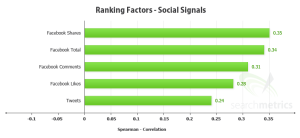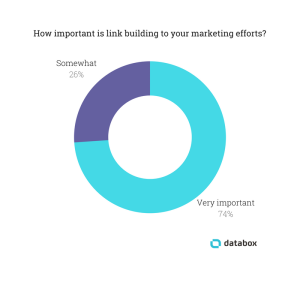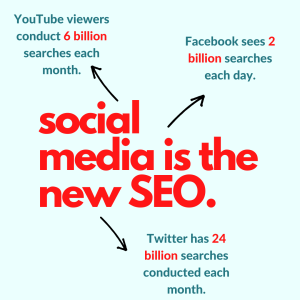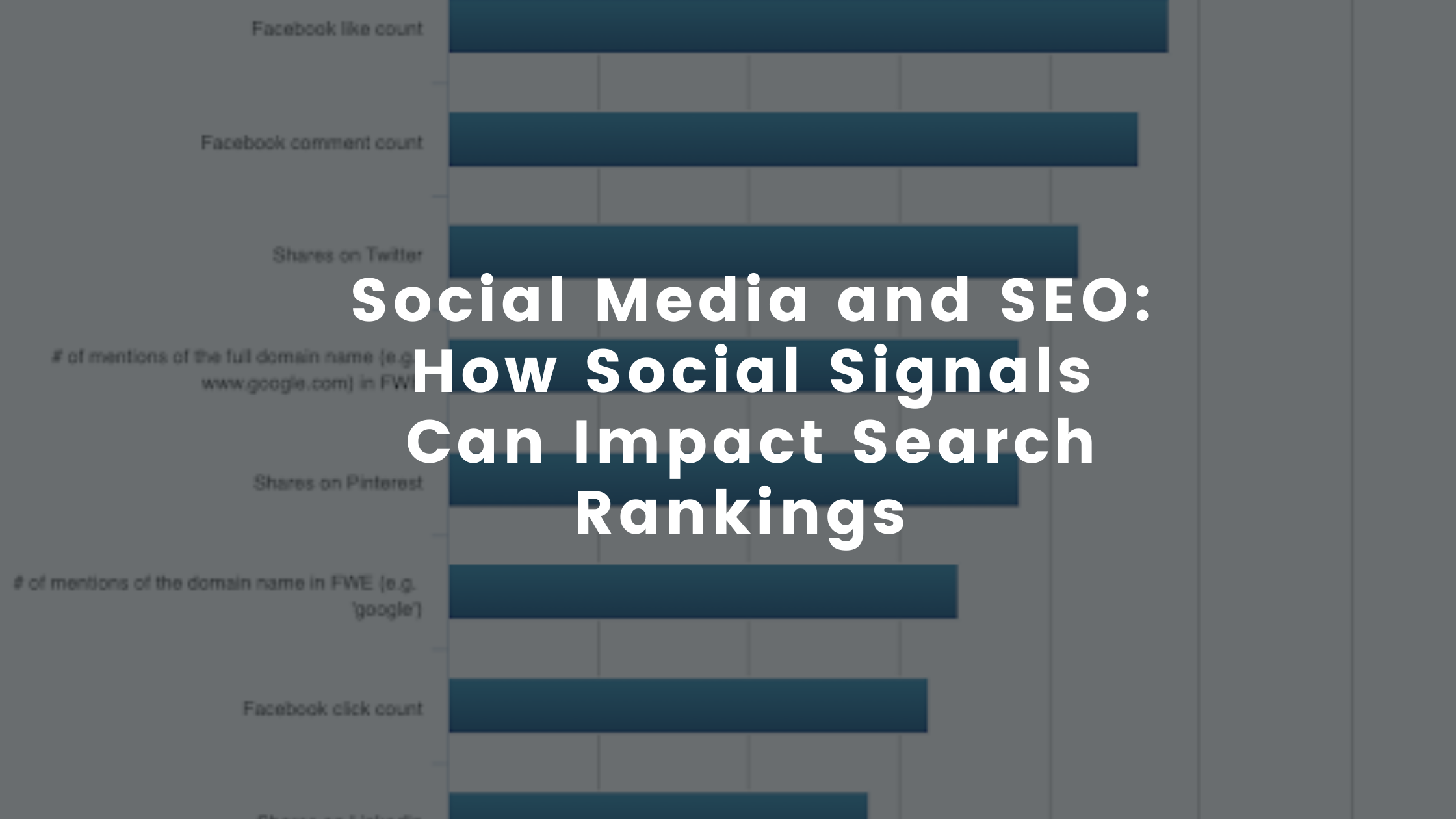Back in 2014, Google’s former head of webspam Matt Cutts stated in a YouTube video that social signals do not affect search rankings. This statement changed the game for many businesses and marketers that prioritized social signals in their SEO strategies. Since then, Google has not indicated whether this statement regarding ranking factors is still accurate. Today, social signals still serve as a core part of every successful business’ marketing strategy, but what should businesses know about the effects of these metrics on SEO rankings?
Contents
Social Signals: What Are They and Why Do They Matter?
Social signals are the metrics used on social media platforms such as Instagram, Facebook, and Twitter which indicate a profile’s authority and influence. These metrics include the likes, shares, comments, reposts, and number of followers a profile has.
So, why do social signals matter for businesses? The greater the number of social signals a business has, the more visible they are to target audiences.
Social posts that have a high number of social signals can increase follower counts and boost social rankings, thereby increasing the virality of content. Additionally, social signals help audiences by serving as “social proof.” Companies that receive more social signals are deemed trustworthy and high-quality.
Finally, these powerful metrics allow businesses to monitor audience engagement. Social signals can highlight which areas of a brand’s marketing strategies need improvement in order to better connect with their followers and promote their brand. Social attention is a key contributor to a company’s success.
By analyzing social signals, businesses can fine-tune their online presence and rise through the ranks!
How Algorithms Have Evolved to Today’s Standards
To understand Google’s stance on social media and SEO, we need to know how their algorithm has changed throughout the years.
In 2010, Bing and Google claimed they utilized Twitter and Facebook links and rankings in their web search rankings. Just four years later, Google changed its stance and stated that social signals did not affect web search rankings. Since 2014, Google has not amended its previous statements, and it’s safe to assume that they have not changed their algorithm.
So what has changed?
Today, social media dominates almost every small business’s marketing strategy. Consumers use social media to learn about emerging small businesses and keep up with their favorite brands. Platforms such as Twitter, Instagram, and Facebook are critical in amassing brand exposure.
Social media has changed the game for businesses looking to gain exposure to their websites. Naturally, the web is a social system. It can help companies express identities, foster relationships, and share ideas. Overall, businesses looking to improve their search rankings can only benefit from incorporating social media into their SEO strategies.
The Indirect Relationship Between SEO and Social Signals
Although there is no direct correlation between social signals and search rankings, studies show that there is an indirect relationship between the two.

In a study conducted by Moz, the number of shares a webpage has tends to show a significant positive correlation with rankings. The results showed that social signals including likes, shares, and comments on Facebook ranked the highest.
So, it’s clear that regardless of Google’s final say on the matter in 2014, social signals can now significantly impact SEO. Furthermore, social signals serve as an indirect factor in search rankings.
Let’s discuss three ways that brands can use social signals to improve their SEO strategies.
1. Social Signals Encourage Brand Visibility
Brand exposure is a crucial reason why small businesses must incorporate social media into SEO strategies.
Today, social media is one of the most important tools for any modern business. Likes, shares, and comments can boost traffic to your small business’ online social media accounts and websites. When audiences see people engaging with your business’ posts on their social media feeds, this can increase your brand’s visibility.
Furthermore, social signals can increase brand trust and customer loyalty. For example, audiences may see your business as a valuable and trustworthy source when they see people engaging with your business on social media.
2. Social Signals and Backlinks Can Increase Traffic to Your Website

According to a survey conducted by Databox, 74% of marketers believe that link-sharing plays a key role in successful marketing.
Backlinks are links that connect a page on a website to another. When audiences see your content on social media, they may interact with your business by sharing these backlinks.
Additionally, the more likes, shares, and comments a post has, the more likely people will deem content share-worthy for their followers.
As a result, this can spread awareness of your brand and attract new customers. This creates a chain of sharing and link-building.
To maximize the benefits of all your effort, it’s important that your backlinks are credible. This means that social profiles should be consistently optimized to ensure that all links are updated.
3. Use Social Media Search Engines to Your Advantage
While Google may be the most popular search engine, it’s certainly not the only one. In fact, every social media platform has its own unique search engine and algorithm. These search engines can help you increase followers, website traffic, and ultimately impact your search ranking.
What does this mean for SEO? Social media is quickly becoming the new SEO.
SEO has expanded to include searches conducted on platforms such as Facebook and Twitter’s search engines. There are two major ways to use these search engines to improve search rankings.

First, individuals using social media apps can discover your company while searching for related images, hashtags, and categories. Businesses benefit from using popular hashtags, keywords, and attention-grabbing content in their posts.
Secondly, social media is becoming the new “go-to” method of discovery for consumers.
Audiences may opt toward using apps such as Instagram, Facebook, and Twitter to learn about companies. These platforms allow audiences to quickly scroll through a brand’s page to understand a brand’s identity.
Search engines are extremely powerful in the SEO world when used correctly; however, with an overwhelming number of searches conducted on social media every day, it’s more important than ever for businesses to optimize their social presence.
A quick search on Instagram or Facebook may show numerous profiles, and it can be hard to find the correct account.
Brands must ensure that individuals searching for them can easily distinguish their profiles from others. Additionally, businesses that have multiple profiles should consider deleting some of their accounts or clearly labeling them so that consumers can quickly find the one they’re searching for.
Conclusion
Social signals are a valuable metric for every small business looking to gain brand exposure. Although Google has not updated its stance since 2014 on whether social signals are incorporated in its algorithm, these metrics are indirectly connected to SEO. Moreover, there are numerous benefits of using social signals.
Content that receives more likes and shares can boost a company’s visibility. In turn, this can lead to an increase in engagement, ultimately resulting in stronger brand trust and customer loyalty. Social signals can also increase web traffic. By using backlinks on social media, businesses can spread awareness of their brand and create a stronger following. This can lead to a chain of link-sharing and more brand exposure. Finally, social signals are becoming the new SEO. Today, an increasing number of audiences are using search engines on social platforms to find businesses. To appeal to social search engines, companies must use hashtags, categories, and share-worthy content. Additionally, the usage of search engines makes it more important than ever for companies to optimize their social presence so that audiences can quickly find their profiles.
Overall, social signals are a valuable tool for every business looking to strengthen its SEO strategies. To learn more about boosting brand exposure and SEO for your small business, click here!


